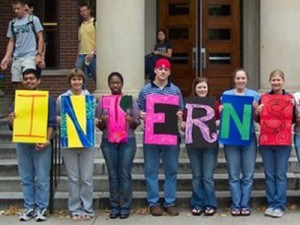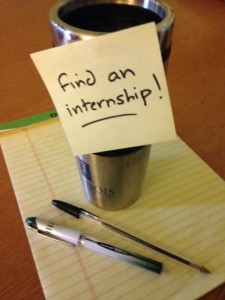 Now is a good time to start thinking about summer internships.
Now is a good time to start thinking about summer internships.
You can find a hand-picked selection of offerings from I-Link on the Internships webpage, but this list is far from exhaustive. Even if you see a few things there you want to apply for, looking on your own will make it more likely that you find an internship that will advance your career goals.
Not sure what your career goals are? Not clear on exactly how an internship fits into your plans? Some advice:
- Create a need/want list. Brainstorm all the things you would like an internship to include, taking into account salary, location, opportunities to learn relevant skills, time to do the other things you need to do in the summer, mentoring, opportunities to network, exposure to particular fields or industries, and the like. Then separate the list into things that you would like versus things that an internship HAS to include in order to be helpful to you.
- Think carefully about whether an internship is the only or best way to move forward on your career path. Knowing what you want to gain from an internship will help you evaluate whether a particular opportunity will be beneficial or exploitative. Depending on your goals, a paid job, some job-shadowing and informational interviewing, or a volunteer position could give you similar experience without.the time commitment of an internship. Particularly if you’re only applying for a few highly competitive internships, having a good backup plan in mind will help keep your focus where it belongs–on the big picture, rather than on any one opportunity.
- Start looking.
- I-Link is a great place for Illinois students to start, but it’s not the only source.
- Steer clear of opportunities that charge fees or that won’t offer meaningful supervision.
- Check out the websites of companies or organizations that interest you; a “careers” or “opportunities” or “volunteer” tab will often take you to information about any internships they offer.
- Search the idealist.org for openings with nonprofit organizations.
- Search indeed.com because it’s one of the largest and most popular job-search websites.
- Search usajobs.gov for positions with the US government.
- Get your application materials together:
- gather all the relevant information for your resume and start putting it together in a graceful and clear format. You’ll need to customize your resume for each internship that asks for one, but it’s helpful to get feedback on an all-purpose version of the document from as many people as possible (including the English Department’s own Director of Internships, who is happy to guide you in writing an effective resume)
- talk to people you might need as references–make sure they’re willing to be called on your behalf and that you have up-to-date contact information to give potential internship employers.
- if you are applying for positions that require writing samples, decide which of your academic papers or extracurricular writing would best serve the purpose.
- Sometimes marketing or communications positions give you a specific writing prompt or encourage you to be “creative” in your application. If so, think of your application as a writing audition: you’re demonstrating the very communication skills that your employer will draw on if you’re selected. Read as much of the organization’s own material as you can and try to match their style and sense of humor.
- Keep track of what you apply to and when.
- Keep searching for new opportunities, even after you start submitting applications.
- Have a meaningful backup plan in mind: if you don’t get any of the internships you’re applying to, what combination of paid employment, volunteer work, and independent activity will help you gain relevant experience over the summer?
- Keep the English Advising Office in the loop! We want to know about your successes, and we’re also hear to help you tweak your application materials and regroup if things don’t work out.
Continue reading “Eight Steps toward a Summer Internship”





